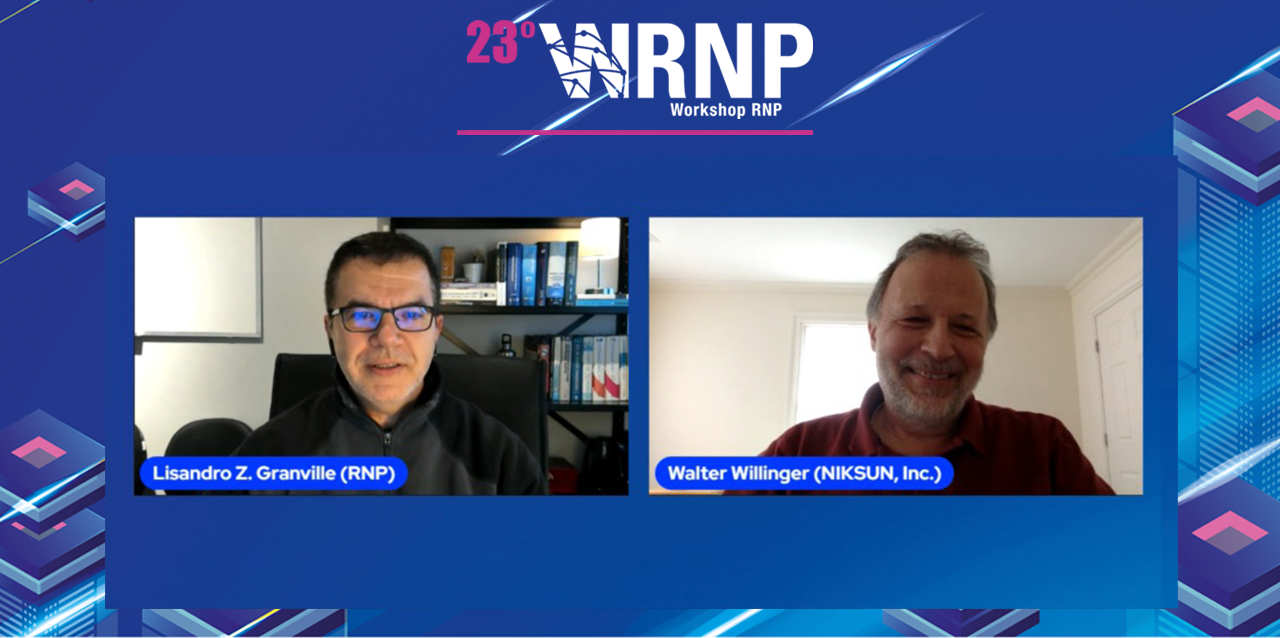‘There is an effort to get the networks to defend themselves,’ says Willinger
Artificial intelligence (AI) and machine learning (ML) are increasingly recurring topics in the cybersecurity debate and were central themes in the schedule of the second day of the 23rd RNP Workshop. The chief scientist of NIKSUN, Walter Willinger, gave the opening lecture this Tuesday (24) on the use of AI and ML in the area of computer networks. Lisandro Granville, RNP's R&D Deputy Director, moderated the WRNP keynote speaker's lecture, entitled "AI and Cybersecurity: The Emperor has no Clothes", which brought important questions about advances in the research area and solutions to network security problems.
The cybersecurity-related AI and ML market was estimated to be worth around $10 billion in the last year alone. Willinger presented the application of systems in the cybersecurity area, from the use of machine learning to improve the protection of the network itself. Despite believing in the possibility of an autonomous model, the scientist says that there is still a lot of work to be done in this direction.
“The concept is very abstract. You see that there is an effort to make the networks defend themselves in the future. They want to believe it, even though it hasn't been demonstrated yet. But we are making progress”, he said.
Willinger stated that there are three major challenges to finding a solution for using technology to protect networks. “It takes a huge effort in this study to understand what we can achieve. We have three important activities that need to happen in the field. First, we need to know how to monitor and feel this network. What data are we collecting and how was it collected? Then how do we make the inference? How long does it take to decide what to do? Today, this can be more automatic from machine learning. And finally, how do we put this into practice? What actions should we take with the data in hand?”, asked the researcher.
The chief scientist at NIKSUN also commented on the differences between black box models, prevalent in companies, and white box systems. “Most modern learning models work on the black box system, which doesn't tell you how it collects data. This is a problem in the area of cybersecurity, because they hide the game. In general, companies are very reluctant to provide information”, he said.
For him, the impossibility of access can generate a credibility problem. “In the cybersecurity space, there is a trust issue. If the operator trusts the model, is able to control, access and work with it, then reliability increases. How can you demonstrate that this model works so that other people can trust it?” he explained.
Willinger commented that the use of white box technologies could facilitate the understanding of the system, by clearly showing the decision tree. “You can understand what path was taken to reach the result. It will make you more satisfied with the model because you understand how it works and can interfere if necessary”, he said.
Also according to the researcher, there are great advances in the area. “There are efforts on several fronts and we already have promising results. This notion of how you demonstrate that you can trust a model goes into a second phase of research. From AI and ML, we can develop other things in the data plane. This is something we could not have done a few years ago”, he concluded.
Deep Techs and Ipê Network
The panel “Deep Techs and NetRNP Techs: knowing and exploring synergies” was led by RNP's Research and Development manager, André Marins, and by the institution's Research, Development and Innovation advisor, José Henrique Dieguez. Having as guests Guy Perelmuter (CEO of Grids Capital), Marcelo de Abreu Borges (CEO of Wisecare) and Eloi Rocha Neto (CEO of Liteme), the session demonstrated possible applications of deep tech in areas such as work, industry, education, security, in addition to climate change. These are technologies such as artificial intelligence, biotechnology, 3D printing, autonomous vehicles, nanotechnology, robotics, among others.
During the lecture, Perelmuter presented expected changes for the future, accelerated by the COVID-19 pandemic, and stated that progress is related to this technology. “We currently have important discussions about the professions that will last over the decades, which ones exist today and are amenable to automation and which professions will emerge in the future. When we look to the future of work, it has the deep techs to support it. And that will spill over into other areas, like education, for example”, he said.
The morning program also included the session “The Ipê network: current status, perspectives and challenges”. Mediated by Ari Frazão, deputy director of Engineering and Operations at RNP, the panel brought together Eduardo Grizendi, director of Engineering and Operations; Aluizio Hazin, backbone coordinator; Janice Ribeiro, operations manager, as well as James Meyer, CEO of Infobarra (telecommunications company).
They presented the Ipê Network, present throughout the national territory, which offers Internet access to teaching and research institutions. Capable of supporting the transmission of large volumes of data, the network is essential for the development of scientific projects and new technologies.
